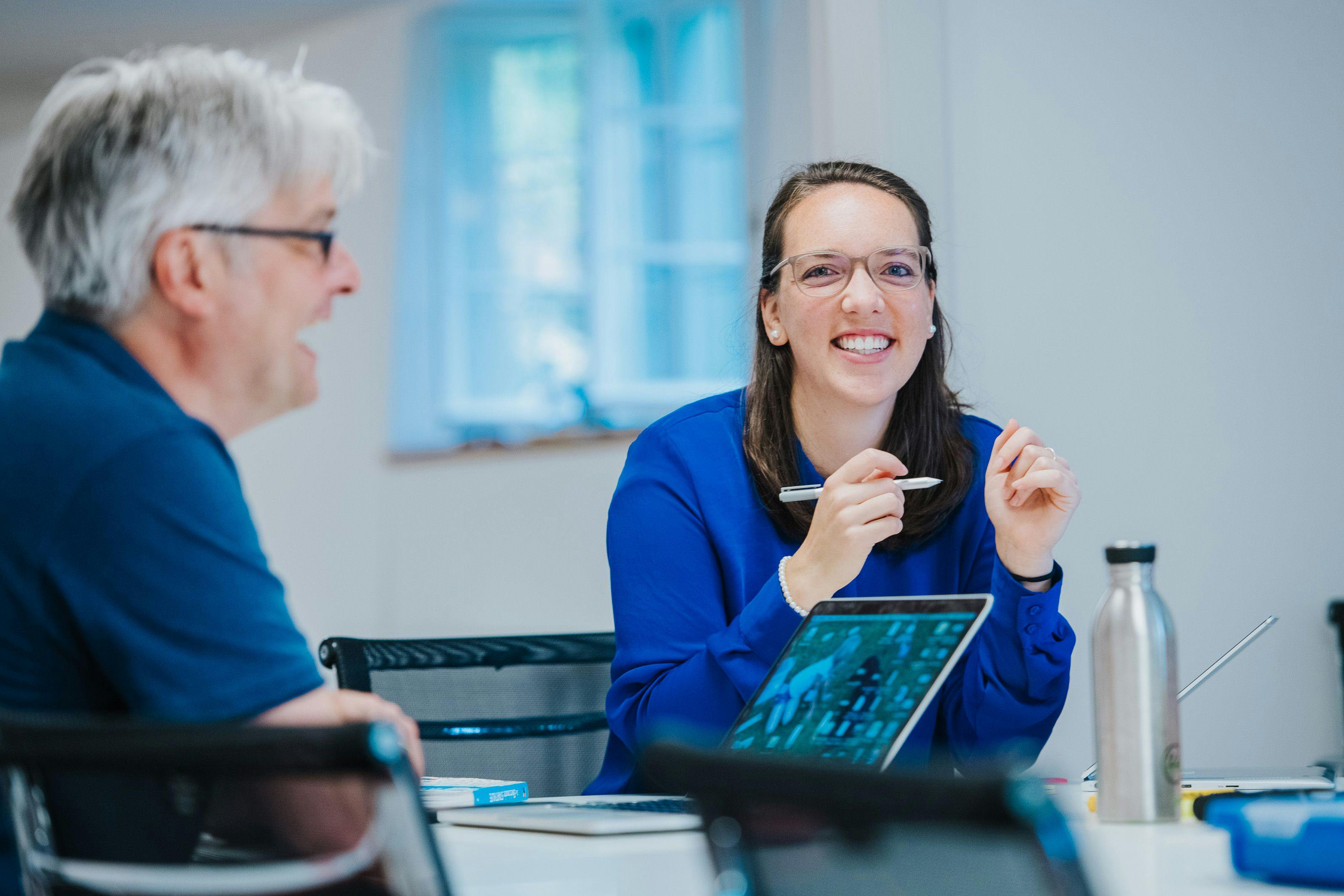Open Talk
Michèle Müller
Learning (through) your own strengths
Profession
MSc in Sociology and Geography
Role at TBF
Project Manager
With TBF since
2018
Michèle, you started out in TBF on projects of a completely different kind. Why was that?
I’ll have to go back a bit further to explain that one. My first job took me to the Netherlands, where I worked on urban development for Amsterdam city council. My area of work was called ‘nieuwe opgaven’, which basically means ‘new tasks’. The name says it all: my team functioned as a kind of emergency urban development office and worked only on the most pressing challenges. That’s when I first realised how comfortable I am with what looks like an overload of work; it presses my creative buttons. I really thrive on that unplanned interconnection of skills, people and projects.
Once I was back in Switzerland, I was eager to find out where I’d end up. After all, job sites don’t let you filter by criteria like ‘open company culture’ or ‘philosophy of sharing’. I came across TBF through an acquaintance, who is now a colleague, and my interest was piqued. I sent them a speculative application and that’s how I got into the project development and management team.
I quickly began to connect with people outside my area of work. This helped me cement my own personal network, but still I felt like I wasn’t really in my element. This sense of stagnation presented me with an important decision: did I want to stay or move on? I decided to stay because I saw many fascinating issues and ways to put my strengths to good use. The question remained though: how do I do this? So, I went about looking for informal mentors. Inch by inch, this helped me bring out my strengths and invest them in projects, which helped me feel more and more involved. This didn’t happen suddenly though; it was a gradual process.
What were the challenges in this shift?
Staying true to myself. In project management, I was expected to present a predefined skillset – something I didn’t conform to at all. On the one hand, I brought skills that came as a bit of a surprise. I’m good at juggling uncertainties and place great value on sharing and connecting. On the other hand, I confused people because there were some skills, I didn’t value highly at all and these were precisely the skills I was being measured against. ‘Be patient, it will happen,’ I heard time and again. However hard I tried to reconcile myself with things like tiny details and standardised processes, it just wouldn’t go in. I was a penguin trying to learn how to fly.
What does it mean for you to be able to utilise and really inhabit your strengths now?
I underestimated how crucial this was. I feel great because I can utilise my strengths where they're recognised. There’s an interplay of self-confidence and authenticity that allows me to take on responsibility. To do this, I need to stay open minded. As long as my position isn’t set in stone, I will continue to grow. Ultimately, this means that I always reflect on what I do and question what no longer fits. I now know, for example, that I am not a perfectionist. Personally, it suits me much better just to keep the essential points in view. And that’s absolutely fine because we always work as a team in our projects, and we need people with different perspectives. That’s something I first had to learn, and it required me to have the courage to be myself.

How do you manage the balance between your learning, your authenticity and any uncertainty?
My not so well-kept secret is networking. I usually work in tandem with others. I search out new mentors depending on what I need to learn. The aim with this is not to copy whoever is coaching me, but to use the dialogue with them to get closer to who I am.
This exchange also takes place between ongoing projects. What I learn doing A, I can then apply immediately to project B. When I’m able to create these kinds of connections between projects, skills and people, that’s a big win for me. If I only ever worked on one project at once, I’d never be able to link things up in this way.
What impact do you think your story has on TBF?
I’d like to be able to inspire others. Enjoying your work breeds a whole new mindset. The ability to be present and effective in a way that resonates with your own qualities is fundamental to success – both personally and professionally.
I’m able to see the growing commitment to prioritise people and their joint learning at TBF, and I love that. I share this visionary principle. It’s an incredibly valuable thing to be surrounded by other dedicated team players and be able to invest this enthusiasm into new projects. Ultimately, it’s about helping each other grow and encouraging independence – and clearing any dependencies or obstacles out of the way while you’re doing it. When this process starts rolling and it’s just great fun collaborating with clients, that’s when I’m in my element.



